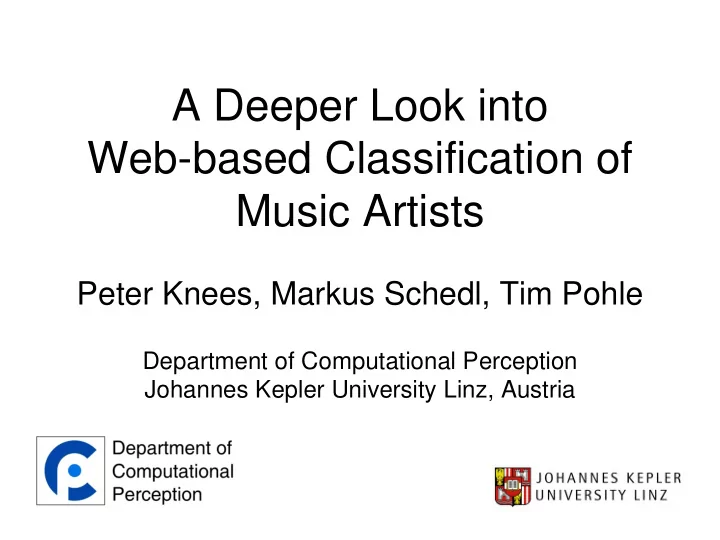

A Deeper Look into Web-based Classification of Music Artists Peter Knees, Markus Schedl, Tim Pohle Department of Computational Perception Johannes Kepler University Linz, Austria
Overview • Artist Classification with Web-based Data • “Improvements” – Optimizing Queries – Page Filtering – Investigation of Results • Simplified Approach • Conclusions for Future Work
Introduction • Idea: Classify music artists into genres based on related Web pages • Obtain related Web pages via search engine – Then: Text Categorization task – tf x idf weighted term vectors describe artists – χ ² -test for dimensionality reduction • No audio signal involved (no semantics either…)
Artist Classification with Web-based Data (ISMIR 2004) web pages word lists Genre 1 … Genre n Classifier Genre ? Optimize Filter Queries Pages
Evaluation • On 3 different genre taxonomies – c224a : from ISMIR’04 paper ( 224 artists, 14 genres, baseline 7.4%) – uspop2002 : Berenzweig et al., CMJ 28(2) 2004 ( 400a, 10g, bl 73.3% ) – c103a : Pampalk et al., ISMIR’05 ( 103a, 22g, bl 5.8% ) • n-fold Cross Validation • SVM and Nearest Neighbor Classification
Optimizing Queries • “Let Google do the filtering” • Saves bandwidth and time • Find terms that indicate relevant pages analytically • To this end: Create a ground truth set of Web pages labelled either ”informative” or “uninformative”
Optimizing Queries (2) • Starting with 700 random pages retrieved via “ artist name ”+music (35 new artists á 20pg) • Labelling done by 3 experts: full agreement on 538 pages (198 informative, 340 not) • χ ² -test to identify most discriminative terms • also done for binary combinations of terms +term1 +term2, +term1 –term2, -term1 +term2, -term1 -term2
Optimizing Queries (3)
Optimizing Queries - Results • Classification Accuracy (avg. over 50-fold CV)
Page Filtering • Remove “uninformative” pages from retrieved set (worked for Baumann et al, WEDELMUSIC’03) • Use ground truth set to train classifier Features: tf x idf weigths + HTML structure info (tag frequencies) • Used RIPPER rule learner (estimated prediction acc.: 83%)
Page Filtering (2) • Obtained rule set informative informative informative informative informative not informative
Page Filtering - Results • Classification Accuracy (avg. over 10-fold CV)
Discussion • Neither Query Optimization nor Page Filtering consistently improved classification accuracy • Problem seems to be the “ground truth page set” • Users’ “informativeness” judgments not useful for genre classification • What is useful for genre classification?
100 Most Relevant Terms for “Country” artist name (58) location/institution (21) instrument, role (1) album/track title (11) genre, style (8) adjectives (0)
Simplified Approach • Proper nouns (especially prototypical artist names) are very important for class. • Modify queries “ artist name ” +“similar artists” “ artist name ” +“related artists” • Parse directly Google result pages (results are contained in snippets)
Google Snippets
Simplified Approach - Results • Classification Accuracy (avg. over 50-fold CV)
Conclusions • No improvements through Query Optimization or Page Filtering • Genre classification (with χ ² -test) heavily dependent on proper nouns; degrades to co-occurrence analysis • Extensional Genre Definition • Other Web-based MIR tasks more interesting
Recommend
More recommend